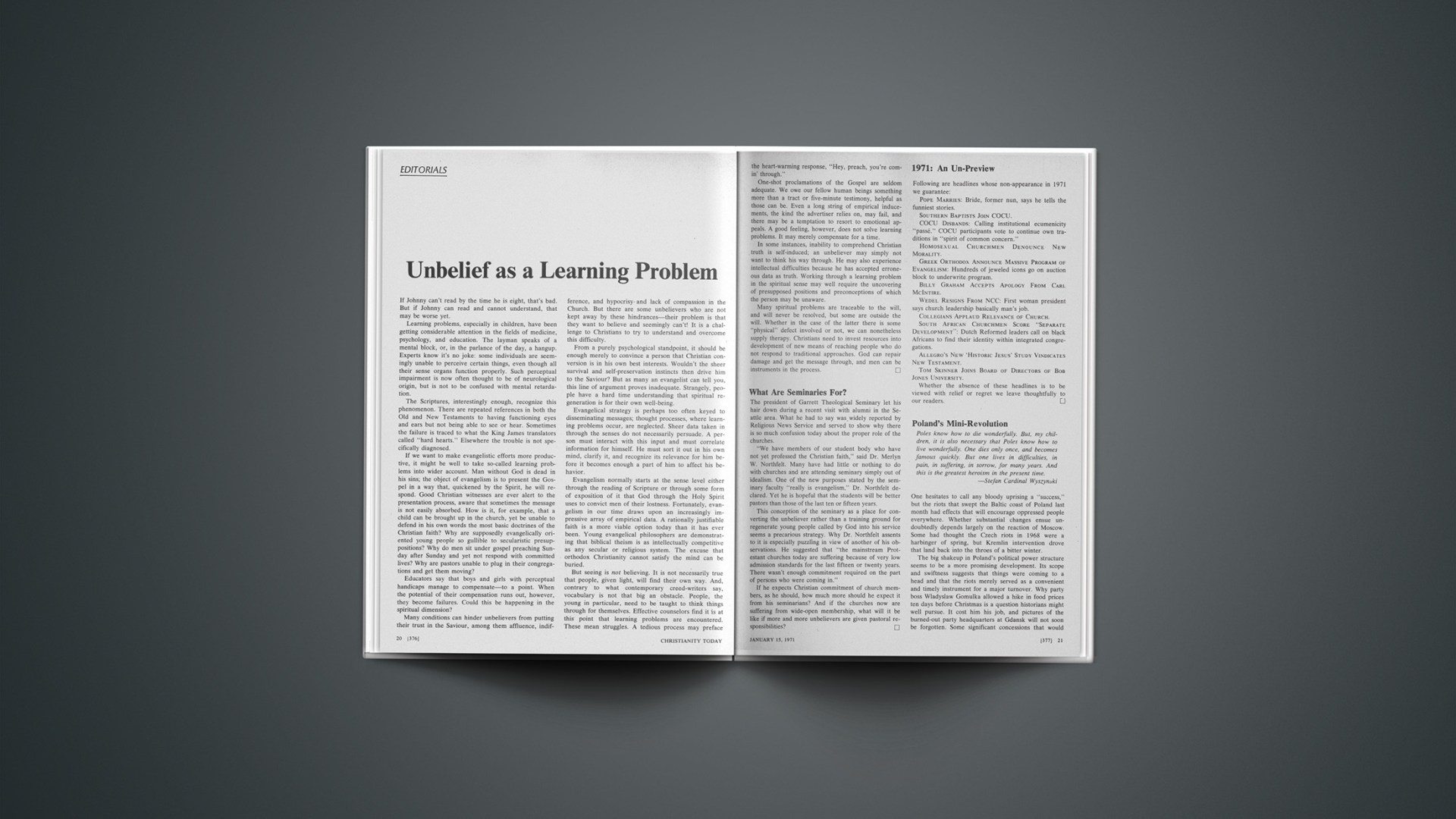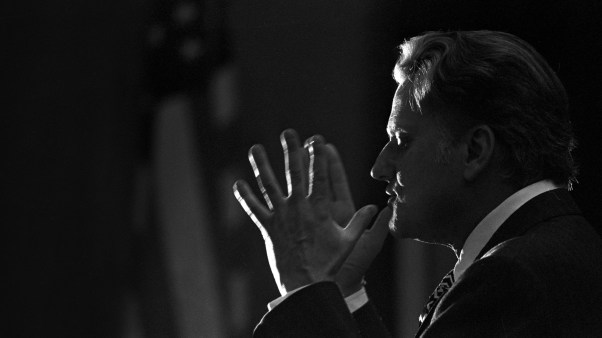EDITORIALS
If Johnny can’t read by the time he is eight, that’s bad. But if Johnny can read and cannot understand, that may be worse yet.
Learning problems, especially in children, have been getting considerable attention in the fields of medicine, psychology, and education. The layman speaks of a mental block, or, in the parlance of the day, a hangup. Experts know it’s no joke: some individuals are seemingly unable to perceive certain things, even though all their sense organs function properly. Such perceptual impairment is now often thought to be of neurological origin, but is not to be confused with mental retardation.
The Scriptures, interestingly enough, recognize this phenomenon. There are repeated references in both the Old and New Testaments to having functioning eyes and ears but not being able to see or hear. Sometimes the failure is traced to what the King James translators called “hard hearts.” Elsewhere the trouble is not specifically diagnosed.
If we want to make evangelistic efforts more productive, it might be well to take so-called learning problems into wider account. Man without God is dead in his sins; the object of evangelism is to present the Gospel in a way that, quickened by the Spirit, he will respond. Good Christian witnesses are ever alert to the presentation process, aware that sometimes the message is not easily absorbed. How is it, for example, that a child can be brought up in the church, yet be unable to defend in his own words the most basic doctrines of the Christian faith? Why are supposedly evangelically oriented young people so gullible to secularistic presuppositions? Why do men sit under gospel preaching Sunday after Sunday and yet not respond with committed lives? Why are pastors unable to plug in their congregations and get them moving?
Educators say that boys and girls with perceptual handicaps manage to compensate—to a point. When the potential of their compensation runs out, however, they become failures. Could this be happening in the spiritual dimension?
Many conditions can hinder unbelievers from putting their trust in the Saviour, among them affluence, indifference, and hypocrisy and lack of compassion in the Church. But there are some unbelievers who are not kept away by these hindrances—their problem is that they want to believe and seemingly can’t! It is a challenge to Christians to try to understand and overcome this difficulty.
From a purely psychological standpoint, it should be enough merely to convince a person that Christian conversion is in his own best interests. Wouldn’t the sheer survival and self-preservation instincts then drive him to the Saviour? But as many an evangelist can tell you, this line of argument proves inadequate. Strangely, people have a hard time understanding that spiritual regeneration is for their own well-being.
Evangelical strategy is perhaps too often keyed to disseminating messages; thought processes, where learning problems occur, are neglected. Sheer data taken in through the senses do not necessarily persuade. A person must interact with this input and must correlate information for himself. He must sort it out in his own mind, clarify it, and recognize its relevance for him before it becomes enough a part of him to affect his behavior.
Evangelism normally starts at the sense level either through the reading of Scripture or through some form of exposition of it that God through the Holy Spirit uses to convict men of their lostness. Fortunately, evangelism in our time draws upon an increasingly impressive array of empirical data. A rationally justifiable faith is a more viable option today than it has ever been. Young evangelical philosophers are demonstrating that biblical theism is as intellectually competitive as any secular or religious system. The excuse that orthodox Christianity cannot satisfy the mind can be buried.
But seeing is not believing. It is not necessarily true that people, given light, will find their own Way. And, contrary to what contemporary creed-writers say, vocabulary is not that big an obstacle. People, the young in particular, need to be taught to think things through for themselves. Effective counselors find it is at this point that learning problems are encountered. These mean struggles. A tedious process may preface the heart-warming response, “Hey, preach, you’re comin’ through.”
One-shot proclamations of the Gospel are seldom adequate. We owe our fellow human beings something more than a tract or five-minute testimony, helpful as those can be. Even a long string of empirical inducements, the kind the advertiser relies on, may fail, and there may be a temptation to resort to emotional appeals. A good feeling, however, does not solve learning problems. It may merely compensate for a time.
In some instances, inability to comprehend Christian truth is self-induced; an unbeliever may simply not want to think his way through. He may also experience intellectual difficulties because he has accepted erroneous data as truth. Working through a learning problem in the spiritual sense may well require the uncovering of presupposed positions and preconceptions of which the person may be unaware.
Many spiritual problems are traceable to the will, and will never be resolved, but some are outside the will. Whether in the case of the latter there is some “physical” defect involved or not, we can nonetheless supply therapy. Christians need to invest resources into development of new means of reaching people who do not respond to traditional approaches. God can repair damage and get the message through, and men can be instruments in the process.
What Are Seminaries For?
The president of Garrett Theological Seminary let his hair down during a recent visit with alumni in the Seattle area. What he had to say was widely reported by Religious News Service and served to show why there is so much confusion today about the proper role of the churches.
“We have members of our student body who have not yet professed the Christian faith,” said Dr. Merlyn W. Northfelt. Many have had little or nothing to do with churches and are attending seminary simply out of idealism. One of the new purposes stated by the seminary faculty “really is evangelism,” Dr. Northfelt declared. Yet he is hopeful that the students will be better pastors than those of the last ten or fifteen years.
This conception of the seminary as a place for converting the unbeliever rather than a training ground for regenerate young people called by God into his service seems a precarious strategy. Why Dr. Northfelt assents to it is especially puzzling in view of another of his observations. He suggested that “the mainstream Protestant churches today are suffering because of very low admission standards for the last fifteen or twenty years. There wasn’t enough commitment required on the part of persons who were coming in.”
If he expects Christian commitment of church members, as he should, how much more should he expect it from his seminarians? And if the churches now are suffering from wide-open membership, what will it be like if more and more unbelievers are given pastoral responsibilities?
1971: An Un-Preview
Following are headlines whose non-appearance in 1971 we guarantee:
POPE MARRIES: Bride, former nun, says he tells the funniest stories.
SOUTHERN BAPTISTS JOIN COCU.
COCU DISBANDS: Calling institutional ecumenicity “passé.” COCU participants vote to continue own traditions in “spirit of common concern.”
HOMOSEXUAL CHURCHMEN DENOUNCE NEW MORALITY.
GREEK ORTHODOX ANNOUNCE MASSIVE PROGRAM OF EVANGELISM: Hundreds of jeweled icons go on auction block to underwrite program.
BILLY GRAHAM ACCEPTS APOLOGY FROM CARL MCINTIRE.
WEDEL RESIGNS FROM NCC: First woman president says church leadership basically man’s job.
COLLEGIANS APPLAUD RELEVANCE OF CHURCH.
SOUTH AFRICAN CHURCHMEN SCORE “SEPARATE DEVELOPMENT”: Dutch Reformed leaders call on black Africans to find their identity within integrated congregations.
ALLEGRO’S NEW ‘HISTORIC JESUS’ STUDY VINDICATES NEW TESTAMENT.
TOM SKINNER JOINS BOARD OF DIRECTORS OF BOB JONES UNIVERSITY.
Whether the absence of these headlines is to be viewed with relief or regret we leave thoughtfully to our readers.
Poland’S Mini-Revolution
Poles know how to die wonderfully. But, my children, it is also necessary that Poles know how to live wonderfully. One dies only once, and becomes famous quickly. But one lives in difficulties, in pain, in suffering, in sorrow, for many years. And this is the greatest heroism in the present time.
—Stefan Cardinal Wyszynski
One hesitates to call any bloody uprising a “success,” but the riots that swept the Baltic coast of Poland last month had effects that will encourage oppressed people everywhere. Whether substantial changes ensue undoubtedly depends largely on the reaction of Moscow. Some had thought the Czech riots in 1968 were a harbinger of spring, but Kremlin intervention drove that land back into the throes of a bitter winter.
The big shakeup in Poland’s political power structure seems to be a more promising development. Its scope and swiftness suggests that things were coming to a head and that the riots merely served as a convenient and timely instrument for a major turnover. Why party boss Wladyslaw Gomulka allowed a hike in food prices ten days before Christmas is a question historians might well pursue. It cost him his job, and pictures of the burned-out party headquarters at Gdansk will not soon be forgotten. Some significant concessions that would give more freedom to the Polish people, at least temporarily, may be in the offing.
One of the first promises made by the new Polish premier, Piotr Jaroszewicz, was that he would seek “full normalization of relations” with the Roman Catholic Church. The previous government frequently clashed with Stefan Cardinal Wyszynski, though it must be remembered that it was Gomulka who, when he came to power in 1956, freed the primate of Poland and other members of the hierarchy imprisoned by the Stalinist government.
In a way, the Poles are a deeply religious people, and traditional Roman Catholic beliefs still prevail among the masses. Hardly a breath of the fresh air from the window opened by Pope John has reached Poland, which is both bad and good. There is little of an ecumenical climate to diminish the widespread, non-biblical veneration of the Black Madonna. On the other hand, the status quo protects Catholics in Poland from the new heresies of secularism that have taken a firm hold in some sectors of the Roman church. An easing of restrictions against the church, if it comes, should encourage new evangelical outreach in Poland.
Interestingly, only a month before the revolt the World Council of Churches had announced the signing of what is called a “unique” agreement with Polish officials. The pact was said to be aimed primarily at easing the plight of older people who are ill. The World Council is to contribute $252,000 the first year, if it can raise the money, and the Polish government is to supply $80,000 “capital costs and the entire institutional running costs.” The project will be implemented by a government agency and the Polish Ecumenical Council. The basic anxiety raised here is whether Communists will use the benefits to gain influence among the small non-Catholic churches.
Bju And The Irs
We fervently disagree with the views on race held by our fellow Christians at Bob Jones University. In our opinion, it is clearly contrary to both the letter and the spirit of the Scriptures to exclude persons on grounds of race from participating in Christian organizations for which they are otherwise qualified. Especially in these times it is incredible to hear a well-known Christian institution that prides itself on its faithfulness to the Word of God proclaim that the Bible teaches racial discrimination.
However, we think the Internal Revenue Service has overstepped its bounds in threatening to withdraw BJU from the list of organizations that are tax-exempt and to which contributions are tax-deductible (see January 1 issue, page 39). The government of course has the right to remove from this favorable tax status certain classes of organizations, or certain organizations in a class, whose good faith it has reason to doubt. Hence private, segregated schools started in anticipation of public-school desegregation would understandably be refused the tax-deduction benefit. But BJU has practiced its racial exclusion for a long time, and it maintains that this practice is part of its religious beliefs. We think the IRS action impinges upon freedom of religion. It is not a question of government grants to BJU, which won’t get them anyway. And while the tax-deduction privilege is indeed an indirect subsidy, all of us subsidize religious views we deplore. If the IRS were to rule against this school because of its position on blacks, what would prevent it from ruling against churches that do not admit women into their leadership ranks? We are not here dealing with the state’s right to protect its citizens from what might be harmful practices, such as snake-handling, or refusing blood transfusions for one’s children, or polygamy; blacks are not in this sense harmed by being refused admission to BJU.
The federal government must pursue the dismantling of previously government-sponsored or -abetted segregation vigorously, but at the same time it must stop short (with rare exceptions) of encroaching upon religious convictions of long-standing organizations.
Showing Compassion (Continued)
What does it mean to be compassionate? In this, as in so many other questions concerning our lives, the example of Jesus is recorded in the Gospels for us to follow. In a previous editorial we looked at the times when Jesus is said to have had compassion on multitudes (December 4 issue, page 27). In addition, four passages explicitly speak of his having compassion on individuals. Two blind men cried out to Jesus to give them sight, and he did (Matt. 20:29–34). A leper came to him to be cleansed, and he was (Mark 1:40–42). In both instances, those who approached Jesus firmly believed he was able to heal them.
Another time, the father of a demon-possessed boy, having seen the disciples of Christ fail in their attempts to cast out the demon, came to Jesus, but with less than full assurance that Jesus could succeed (Mark 9:17–25). “If you can do anything …” the man pled, and when Jesus told him that his belief was the key factor, the father replied “I believe!” But he hastened to declare his honest reservations by adding, “Help my unbelief!” Jesus expelled the demon. One does not restrict feelings of compassion to those who meet certain requirements.
Indeed, to act compassionately does not require that the recipient take the initiative. As Jesus came upon a funeral procession, he observed the need of the widow whose only son had died (Luke 7:12–15). Without any request from her, without any evidence that she believed he was able to do such a dramatic miracle as restoring her son to life, he acted.
The one who is compassionate does what he can to relieve the suffering of others, not just when they request it but at other times as well. Although we cannot miraculously restore sight to the blind or wholeness to lepers or life to the dead, there are yet many things we can do to comfort the afflicted, if only we let compassion move us.










